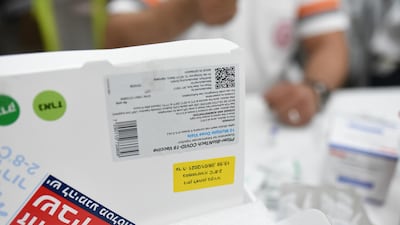Clutching walking sticks, resting in wheelchairs or sitting on plastic chairs, Israeli retirees are lining up to join their country’s record-breaking coronavirus vaccination drive.
“I want to see my grandchildren,” said 90-year-old Boris Einbinder, shortly after receiving his first dose of the Pfizer-BioNTech vaccine.
Resting beside his wife Mara in Pisgat Ze'ev, an Israeli settlement in occupied East Jerusalem, Mr Einbinder said since March they have only seen their six grandchildren from the balcony of their home.
The elderly couple are among nearly 1.4 million Israelis to have received the vaccine so far, accounting for around 15 per cent of the population and far surpassing any other nation.
At the Pisgat Ze’ev assisted living community, paramedics from Israel’s Magen David Adom (MDA) emergency services set up their temporary clinic in a room which doubles as a bomb shelter. “Some people ask me how the vaccine is, if it’s ok,” said Fadi Dekaidek, an MDA paramedic who has worked on the public inoculation drive since it started last month.
“When they hear what I say, they accept taking the vaccine,” he added, putting the early success of the programme down to good governance.
Israel’s health ministry is in charge of the overall operation and sends MDA to care homes, while the emergency services also administer vaccines at some clinics.
The government has prioritised healthcare workers and the over-60s to receive the shot, but to minimise waste some leftover doses are being offered to the general public at the end of the day.
Like Israeli citizens, Palestinian residents of Jerusalem are entitled to receive the vaccine through their health insurance. Clinics in Palestinian neighbourhoods are administering vaccines, without the involvement of the emergency services.
While Prime Minister Benjamin Netanyahu boasted on Tuesday that Israel was vaccinating its population “at a pace that is arousing the wonder of the entire world,” the situation is starkly different in the occupied West Bank and Gaza.
The Palestinian Authority, which governs parts of the West Bank including most cities, is yet to receive any doses.
It has applied to join Covax, a scheme backed by the World Health Organisation which will distribute vaccines to cash-strapped governments for 20 per cent of their population.
"The vaccine is expected to arrive at the end of February, beginning of March," Yaser Bozya, the PA's public health director, told The National.
The Palestinian health ministry is also awaiting a response from the makers of the Russian vaccine Sputnik V, Mr Bozya said, which could potentially be rolled out to the wider Palestinian public.
Israel has been criticised for vaccinating their citizens living in West Bank settlements, while providing no such services to Palestinians living in areas either under full Israeli military rule or those governed by the PA.
In a joint statement last month, organisations including Amnesty International and Physicians for Human Rights Israel urged the authorities to “live up to their legal obligations and ensure that quality vaccines be provided to Palestinians”.
The Israeli health ministry did not respond to repeated requests to comment on why it would not provide vaccines to three million Palestinians in the West Bank, or two million Gazans who have lived under an Israeli blockade since 2007.
While the PA and Hamas, which rules the Gaza Strip, lack the funds to buy up stocks of the Pfizer shot, an Israeli health ministry official told local media his government had paid $62 per dose.
The figure shows Israel bought its initial eight million doses at a far higher cost than the European Union, which paid around $19 per shot according to a Reuters report.
The ability of countries such as Israel to buy up vaccine stocks has exposed vast global health inequalities, which could have a negative impact on the world’s ability to overcome the coronavirus pandemic.
“Even if you see beyond the justice and fairness aspects, I think it’s important from an infectious disease control perspective,” said Anna Mia Ekström, a clinical professor at Sweden’s Karolinska Institute.
“Because if the virus continues to circulate around the world, we can’t really stop this pandemic,” added the professor, a specialist in infectious disease epidemiology.
Further border closures, limits to international trade and new coronavirus variants are all possible if vaccines are not evenly distributed.
“At national levels, political leaders want to show their constituencies they are acting decisively,” said Ms Ekström. “It’s very short-sighted and quite egoistic to not try to act globally.”
While Mr Netanyahu has celebrated being “first in the world in vaccinations," Israel is planning on slowing down its programme to avoid running out of doses.
“We’ve been vaccinating a lot faster than we were expecting,” said Uriel Goldberg, an MDA spokesman, estimating the majority of Israelis would be vaccinated within a few months.
In the meantime, Israelis are living under a third nationwide lockdown and the government is due to discuss tightening measures this week as coronavirus cases rise.
In Pisgat Ze'ev, the elderly residents thanked medics after receiving their jab and will be back in three weeks to get their second and final dose.
“In a few months, the challenge will be those who don’t want to be vaccinated,” said Mr Goldberg.











